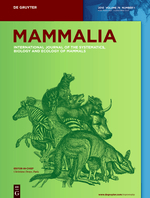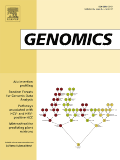
MAMMALIAN GENOME
Scope & Guideline
Illuminating the pathways of mammalian evolution.
Introduction
Aims and Scopes
- Mammalian Genetics and Genomics:
The journal covers a wide range of topics related to the genetics of various mammalian species, including the identification of genetic variants, genomic mapping, and the role of specific genes in health and disease. - Model Organisms and Disease Models:
A significant focus is placed on the use of mouse models and other mammalian species to explore disease mechanisms, develop therapeutic strategies, and understand genetic disorders. - Comparative Genomics:
Research that compares genomes across different mammalian species to uncover evolutionary relationships and functional conservation is a key area of interest. - Functional Genomics and Phenotyping:
The journal includes studies on high-throughput phenotyping, transcriptomic analyses, and the functional characterization of genes and non-coding RNAs. - Resource Development:
Mammalian Genome serves as a hub for the development and sharing of genomic resources, including databases, biobanks, and repositories for mutant and genetically altered mouse models.
Trending and Emerging
- Network Medicine Approaches:
There is an increasing interest in network medicine, which integrates genomic data with other biological and clinical information to identify disease mechanisms and potential therapeutic targets. - Epigenetics and Non-Coding RNAs:
Research on epigenetic modifications and the role of non-coding RNAs in gene regulation and disease is gaining traction, indicating a shift towards understanding complex regulatory networks. - Systems Biology and Integrative Genomics:
Emerging themes include systems biology approaches that combine genomic, transcriptomic, and phenotypic data to provide comprehensive insights into mammalian biology. - High-Throughput Genomic Technologies:
The utilization of advanced genomic technologies such as CRISPR, whole-genome sequencing, and high-throughput phenotyping is on the rise, facilitating deeper exploration of genetic functions and interactions. - Comparative and Evolutionary Genomics:
There is a growing trend towards comparative genomics that seeks to understand evolutionary relationships and functional conservation across species, particularly in relation to disease susceptibility.
Declining or Waning
- Microbiome Studies:
Research specifically focused on the gut microbiome in relation to mammalian health and disease appears to have diminished, possibly as the field has matured or integrated into broader studies of mammalian biology. - Basic Gene Expression Studies:
There is a noticeable decline in papers focusing solely on basic gene expression without the context of functional or disease-related studies, indicating a shift towards more applied genetic research. - Traditional Phenotyping Methods:
Papers that rely on traditional, lower-throughput phenotyping techniques seem to be less frequent, as the field moves towards high-throughput and integrated approaches. - Single Species Studies:
Research focusing exclusively on a single mammalian species, particularly those that do not contribute to translational insights or comparative analysis, has been less common, reflecting a trend towards more comparative and integrative studies.
Similar Journals

BMC GENOMICS
Catalyzing scientific discovery in the world of genomics.BMC Genomics is a premier open-access journal dedicated to advancing the field of genomics through the dissemination of high-quality research articles. Published by BMC, a renowned leader in open-access publishing, this journal has built a solid reputation since its inception in 2000, making significant contributions to the areas of biotechnology and genetics. Holding a prestigious Q1 ranking in Biotechnology and Q2 in Genetics as of 2023, it serves as an essential platform for researchers, professionals, and students alike, facilitating the exchange of innovative ideas and data. With an impactful presence in the Scopus rankings, BMC Genomics currently stands at Rank #90/347 in Genetics, reflecting its influence in the scientific community. Researchers are encouraged to explore the vast array of scholarly articles and engage with cutting-edge genomics research that is crucial for the evolution of various applications in medicine, agriculture, and environmental science. With its open access model, BMC Genomics ensures that groundbreaking research is freely available, fostering collaboration and accelerating scientific discovery on a global scale.

PLoS Genetics
Empowering researchers through open access to genetic innovation.PLoS Genetics, published by the PUBLIC LIBRARY SCIENCE, is a leading open-access journal dedicated to advancing the field of genetics, molecular biology, and related disciplines. With its ISSN of 1553-7404, this esteemed journal has been offering unrestricted access to its content since 2005, fostering a global community of researchers, professionals, and students. Situated in the United States, its contributions can be found at 1160 Battery Street, Ste 100, San Francisco, CA 94111. As of 2023, PLoS Genetics proudly holds a Q1 ranking in multiple categories including Cancer Research, Ecology, Evolution, Behavior and Systematics, Genetics, and Molecular Biology, underscoring its impact in these vital scientific areas. The journal's commitment to disseminating high-quality research is reflected in its impressive Scopus rankings, with notable positions in various fields of study, ensuring that it remains a crucial resource for cutting-edge research and innovation. By providing an open-access platform, PLoS Genetics not only enhances the visibility of genetic research but also encourages collaborations and the sharing of knowledge that can lead to significant breakthroughs in science.

Genome Medicine
Transforming Research into Real-World SolutionsGenome Medicine is a prestigious, peer-reviewed journal published by BMC, focusing on the rapidly evolving fields of genetics, molecular biology, and molecular medicine. Established in 2009 and boasting an open-access format, it has become a leading platform for disseminating high-quality research findings that advance our understanding of genetic diseases and therapeutic innovations. With an impressive Q1 ranking across multiple relevant categories—in particular, genetics (clinical), molecular biology, and molecular medicine—this journal is recognized for its substantial impact in the academic community, as evidenced by its exceptional placement in Scopus rankings. By providing unrestricted access to groundbreaking studies, Genome Medicine fosters collaboration and knowledge sharing among researchers, clinicians, and educators, thus playing a vital role in the transition from fundamental genetic research to clinical applications. Researchers are encouraged to contribute their findings and insights, further solidifying the journal’s position as a pivotal resource for those dedicated to advancing genomic medicine.

Human Genome Variation
Bridging Research and Clinical ApplicationsHuman Genome Variation, published by SpringerNature, is an esteemed open access journal dedicated to the field of genetic research and exploration. Since its inception in 2014, the journal has been at the forefront of advancing our understanding of human genome diversity and its implications in health and disease. With an E-ISSN of 2054-345X, it features a diverse array of studies that encompass biochemistry, genetics, and molecular biology, making it an invaluable resource for researchers and professionals alike. The journal holds a Q3 ranking in both biochemistry and genetics, and a Q4 ranking in molecular biology, highlighting its growing influence within these disciplines. As the landscape of genomics continues to evolve, Human Genome Variation serves as a platform for the dissemination of high-quality research, fostering collaboration and innovation within the scientific community. Researchers and academics are invited to contribute to this pivotal journal, which not only provides open access to its content since 2014 but also aims to bridge the gap between basic research and clinical applications in genetics.

MAMMALIA
Advancing knowledge in mammalian science.MAMMALIA, published by Walter de Gruyter GmbH, is a renowned academic journal founded in 1936 that serves as a pivotal resource for researchers and professionals in the fields of Animal Science and Zoology as well as Ecology, Evolution, Behavior and Systematics. With an ISSN of 0025-1461 and an E-ISSN of 1864-1547, this journal has made significant contributions to mammalian research over the decades and continues to be pivotal in advancing knowledge within the scientific community. MAMMALIA is indexed in prominent databases, boasting a current Scopus ranking that places it within the upper echelons of the Q2 category in Animal Science and Zoology, and Q3 in Ecology, Evolution, Behavior and Systematics. Although it does not offer open access, the journal remains accessible through various academic institutions, ensuring that valuable research findings are disseminated widely. The journal’s commitment to quality and excellence in the study of mammals aligns with its high impact within the field, engaging a diverse readership that includes researchers, students, and professionals dedicated to furthering the understanding of mammalian biology. For more information, visit their office located at Genthiner Strasse 13, D-10785 Berlin, Germany.

GENOMICS
Advancing Genetic Frontiers with PrecisionGENOMICS is a prestigious journal published by Academic Press Inc Elsevier Science, dedicated to advancing the field of genetic research and molecular biology. With an impressive impact factor, this journal is recognized for its rigorous peer-review process and high-quality publications that cover a wide range of topics within the genomics discipline. Operating from the United States, GENOMICS has established itself as a vital resource for researchers, professionals, and students alike, standing at Q2 in the Genetics category according to the latest rankings. With a rich history dating back to 1987 and convergence extending to 2024, the journal highlights cutting-edge discoveries and methodologies, ensuring that its readership remains at the forefront of genetic advancements. Although currently not an open-access journal, articles published within its pages are often accessible through various academic platforms, enhancing worldwide reach and dissemination. For those engaged in the fields of biochemistry, genetics, and molecular biology, GENOMICS serves as an indispensable platform for impactful research and collaborative initiatives.

GENETICA
Illuminating Genetic Discoveries Across DisciplinesGENETICA is a prominent journal published by SPRINGER, dedicated to advancing the field of genetics and its applications across various biological disciplines, including animal science, plant science, and insect science. Since its inception in 1919, the journal has consistently served as a vital platform for researchers and professionals to disseminate high-quality research findings that explore the genetic bases of biological phenomena. With its current scope spanning from 1943 to 2024, GENETICA holds a commendable position in the academic community, as evidenced by its Q2 ranking in both animal science and insect science, and its active contribution to interdisciplinary studies in genetics. Although the journal does not offer open access, it remains accessible through institutional subscriptions and libraries, ensuring its vital research is widely circulated. Researchers, professionals, and students alike will find GENETICA an invaluable resource for the latest discoveries and methodologies in the ever-evolving landscape of genetics.

FUNCTIONAL & INTEGRATIVE GENOMICS
Pioneering Discoveries in Genetics and Molecular BiologyFUNCTIONAL & INTEGRATIVE GENOMICS, published by Springer Heidelberg, is a leading journal in the fields of genetics and molecular biology. Established in 2000, it serves as a pivotal platform for advancing our understanding of genomic functionality and integration, making significant contributions to both basic and applied research in genetics. With a robust impact factor and a ranking in the Q3 quartile for Genetics and Q2 for Medicine (Miscellaneous), the journal aims to publish innovative research that explores the relationships between genomic data and biological functions, appealing to a diverse audience of researchers and professionals. Although it operates under a subscription model, the journal's extensive archives remain a valuable resource for academics seeking to stay abreast of the latest findings and methodologies in genomics. As the field evolves, FUNCTIONAL & INTEGRATIVE GENOMICS remains committed to fostering scholarly dialogue and the dissemination of groundbreaking studies that influence future research trajectories.

CURRENT GENETICS
Elevating Genetic Research to New HeightsCURRENT GENETICS is a prestigious journal published by SPRINGER, dedicated to advancing the field of genetics through the dissemination of high-quality research. With a notable impact factor and ranking in the Q2 category for both Genetics and Medicine (miscellaneous) as of 2023, it firmly establishes itself as a significant resource for the academic community. The journal’s comprehensive scope explores the latest findings in genetic research, along with accompanying interdisciplinary studies, providing a platform for researchers to share innovative ideas and methodologies. ISSN: 0172-8083, E-ISSN: 1432-0983, stands testament to its commitment to scholarly excellence. While Open Access options are not currently available, CURRENT GENETICS remains accessible to a broad audience, promoting a rich exchange of knowledge that supports the vast and evolving discipline of genetics. Since its inception in 1979 and through its converged years till 2024, this journal has played a crucial role in confronting scientific challenges and promoting advancements in genomic medicine and molecular biology. As such, it is an essential read for researchers, professionals, and students keen to remain at the forefront of genetic research.

Genes & Genomics
Unlocking the Secrets of Genomic ScienceGenes & Genomics is a prominent academic journal dedicated to the fields of biochemistry, genetics, and molecular biology, published by Springer from South Korea. With an evolving focus on innovative genetic research and its implications, this journal serves as a crucial platform for disseminating knowledge within the scientific community. The journal has been indexed in Scopus and boasts a Q3 quartile ranking in 2023 for its contributions to these disciplines, highlighting its relevance and growing impact. In addition to traditional subscription options, Genes & Genomics supports Open Access, offering broader accessibility for researchers and enthusiasts eager to explore the latest advancements in genetic studies. Since its inception in 2008, the journal has committed to publishing high-quality research that drives forward our understanding of genetics and its applications, making it an essential resource for researchers, professionals, and students alike who are passionate about the complexities and breakthroughs in genomic sciences.